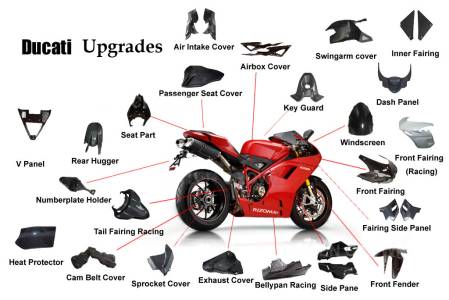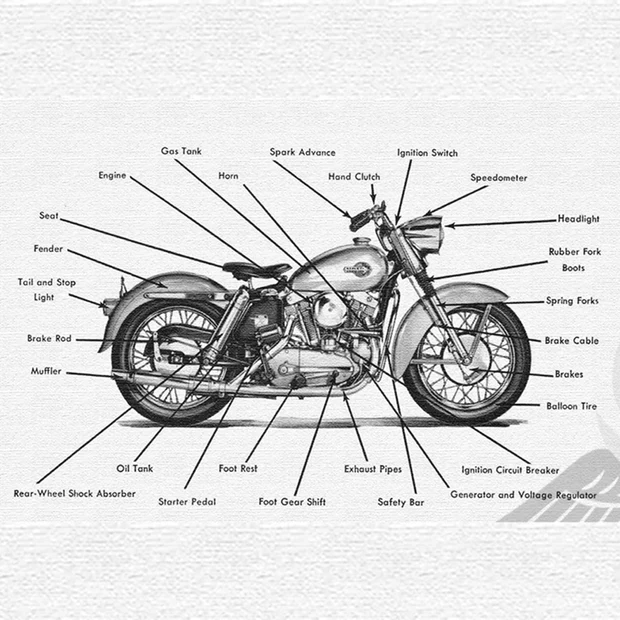Do This First When Your Motorcycle Parts Auckland Start Showing Wear
Do This First When Your Motorcycle Parts Auckland Start Showing Wear
Blog Article
Discover the Vital MotorBike Parts You Required for Optimal Performance
Recognizing the important parts of a bike is fundamental for accomplishing peak efficiency. Each part, from the engine to the stopping system, plays a crucial function in total capability and safety and security. Routine upkeep can prevent unforeseen failings and boost the riding experience. However, numerous motorcyclists forget the intricacies of these systems. Discovering how they collaborate can result in a much more reliable adventure. What important parts should every cyclist focus on?
The Engine: The Heart of Your Bike
The engine works as the core part of a bike, driving its efficiency and specifying its capacities. It is in charge of transforming gas right into power, which powers the bike ahead. Different sorts of engines are employed, consisting of single-cylinder, V-twin, and inline configurations, each offering distinctive characteristics matched for various riding functions and styles. The engine dimension, commonly gauged in cubic centimeters (cc), substantially influences efficiency, with larger engines generally offering more power and torque.Furthermore, the engine's layout and modern technology, such as gas injection systems or air-cooling versus liquid-cooling, influence effectiveness and reliability. Upkeep is important for peak procedure; aspects like routine oil adjustments and monitoring ignition system assurance durability. Riders often take into consideration an engine's responsiveness and level of smoothness, as these qualities enhance the total riding experience. Inevitably, the engine remains a crucial component that specifies not just the bike's efficiency but also the biker's connection to the equipment.
The Transmission: Shifting Gears Smoothly
The transmission plays a crucial role in a motorcycle's efficiency, especially in the technicians of equipment moving. Recognizing exactly how to move gears efficiently can enhance the overall riding experience, while regular maintenance guarantees peak performance. Appropriate interest to these elements can considerably affect the durability and efficiency of the motorbike.

Gear Shifting Mechanics
Smooth gear shifting is necessary for perfect motorbike performance, greatly impacting both acceleration and control. The mechanics of gear changing include the communication in between the clutch, equipment lever, and transmission system. When a motorcyclist involves the clutch, it disengages the engine from the transmission, enabling for an equipment change without harming the elements. A well-timed release of the clutch, incorporated with accurate motion of the gear bar, facilitates a smooth adjustment between equipments. This process assures that the engine operates within its finest power band, improving performance. Motorcycle Spares Christchurch. In addition, understanding the equipment ratios and their effect on rate and torque can aid cyclists make informed options during shifts, ultimately adding to a more pleasurable and receptive riding experience
Maintenance Tips Value
Regular upkeep plays a vital duty in guaranteeing that the transmission system operates efficiently, enabling smooth equipment shifts. Frequently changing the transmission and examining fluid is essential, as old liquid can result in boosted friction and wear. In addition, checking the clutch for wear assurances peak involvement and disengagement, avoiding slippage throughout equipment adjustments. Lubrication of relocating parts is similarly crucial to decrease rubbing and boost efficiency. Bike proprietors should likewise check for leakages and uncommon sounds, as these can indicate underlying issues. By adhering to these upkeep suggestions, riders can prolong the life expectancy of their transmission system, ensuring that equipment shifts stay smooth and contributing to the general efficiency of their motorbike.
The Braking System: Ensuring Safety And Security on Every Experience
Braking systems are basic components that straight influence a motorcycle's safety and security and performance. They are composed of various parts, consisting of brake pads, rotors, calipers, and hydraulic lines, all interacting to assure efficient slowdown. The kind of braking system-- generally either disc or drum-- influences responsiveness and quiting power.Regular upkeep is necessary to support peak performance; used brake pads can cause decreased performance and raised stopping ranges. Furthermore, the high quality of brake liquid need to be monitored, as it can soak up wetness over time, compromising stopping efficiency.Riders should also consider the importance of anti-lock stopping systems (ABS), which protect against wheel lockup during abrupt stops, boosting general safety. Appropriately operating brakes are not practically stopping; they infuse confidence in the biker, permitting safer navigating through different terrains. Ultimately, a trustworthy braking system is crucial for enjoying every ride with comfort.
The Suspension: Enhancing Convenience and Control
A well-functioning shock absorber considerably adds to a motorcycle's general performance, complementing the effectiveness of the braking system. The suspension plays a substantial function in soaking up shocks from unequal surface areas, ensuring a smoother trip while preserving tire call with the roadway. This get in touch with is important for both security and control, permitting riders to browse edges with confidence and precision.Different sorts of suspension systems, such as telescopic forks or mono-shocks, provide differing degrees of convenience and handling. Effectively tuned suspension boosts responsiveness, offering the biker with an extra connected feeling to the motorbike. Regular upkeep checks are necessary to identify the suspension parts, consisting of springs and dampers, are functioning at their ideal. An efficient suspension system not just elevates the riding experience yet additionally adds to the longevity of various other motorbike components by lessening deterioration. Because of this, spending in quality suspension is essential for any kind of major motorbike lover.
The Tires: Connecting You to the Road
Tires play a necessary role in a motorbike's efficiency, serving as the primary link between the roadway and the motorcyclist. Understanding the various types of tires offered can greatly affect taking care of and safety. Furthermore, normal maintenance is essential to assure peak tire efficiency and durability.
Tire Enters Explained
How do different tire kinds influence a motorcycle's efficiency? Tire kinds play a crucial duty in figuring out a motorcycle's security, handling, and grasp. Sporting activity tires, developed for high performance, deal improved grip and responsiveness on smooth roads, making them excellent for competing and aggressive riding. On the other hand, exploring tires focus on sturdiness and comfort, giving a smoother trip for long-distance traveling. Off-road tires, characterized by their sturdy walk patterns, master traction on unpaved surfaces, suitable for journey lovers. Furthermore, dual-sport tires blend characteristics from both on-road and off-road groups, accommodating functional riding needs. Inevitably, choosing the best tire type is important for maximizing efficiency, making sure security, and enhancing the total riding experience.
Upkeep Tips Offered
While riding on the roadway, keeping excellent tire condition is essential for safety and security and efficiency. Routinely examining tire stress is essential, as under-inflated tires can cause inadequate handling and boosted wear. It is advisable to evaluate step deepness frequently; used tires concession hold and security. Furthermore, motorcyclists ought to seek indications of damages, such as fractures or bulges, which Website can show the requirement for substitute. Revolving tires periodically ensures even use, boosting long life. Keeping tires tidy from debris and staying clear of extreme curbs can extend their life-span. Ultimately, maintaining correct positioning and equilibrium adds to peak efficiency, minimizing anxiety on other bike parts. Complying with these upkeep pointers will considerably boost the overall riding experience.
The Fuel System: Sustaining Efficiency and Efficiency
The fuel system plays a vital role in maximizing a motorcycle's efficiency and performance, as it assures the optimal shipment of fuel to the engine. It makes up numerous critical components, including the fuel container, fuel pump, fuel filter, and fuel injectors or carburetor. Each part should work successfully to assure a smooth and powerful ride.The fuel tank stores gasoline and supplies it to the engine through the fuel pump, which generates the required pressure. A fuel filter stops pollutants from going into the engine, while the injectors or carburetor mix fuel with air for combustion.Proper maintenance of the fuel system is important; a stopped up filter or malfunctioning injector can cause lowered efficiency and raised fuel consumption. By confirming that the gas system runs successfully, cyclists can appreciate better throttle feedback, much better fuel economic climate, and in general improved riding experience.
The Electrical System: Powering Your Trip
An efficient electric system is crucial for the total capability and safety and security of a motorbike, as it powers vital elements such as the ignition, lighting, and various digital systems. This system includes the battery, which stores power, and the generator, accountable for generating power while the engine runs. The click here to find out more wiring harness attaches these elements, guaranteeing dependable power distribution.Additionally, fuses shield the system from overloads, while relays assist control high-current tools with low-power signals. A well-kept electrical system boosts performance by ensuring smooth beginnings and consistent procedure of lights and signals, vital for motorcyclist exposure and safety.Regular checks of the battery's cost and connections are necessary for protecting against electric failures. Motorcyclists ought to additionally check circuitry for wear and tear, ensuring all elements operate ideally. Inevitably, a robust electric system adds significantly to the total performance and integrity of the motorbike.
Often Asked Inquiries
How Often Should I Replace My Bike's Battery?
The frequency of motorbike battery substitute depends on usage and upkeep (Motorcycle Spares Christchurch). Typically, batteries need to be replaced every three to 5 years. Normal checks can help identify when a substitute is essential for peak efficiency
What Devices Do I Required for Basic Motorbike Upkeep?
For standard bike maintenance, one requires necessary devices such as an outlet set, wrenches, screwdrivers, pliers, tire pressure gauge, and a torque wrench. These tools assist in reliable maintenance and assure the bike runs efficiently and safely.
How Can I Improve My Motorbike's The rules of aerodynamics?
To enhance motorbike the rules of aerodynamics, one must take into consideration readjusting fairings, utilizing windscreen expansions, optimizing body position, and decreasing total weight. These alterations aid minimize drag, enhancing stability and fuel efficiency during trips.
What Are the Indications of a Failing Electrical System?
Signs of a failing electrical system consist of lowering lights, trouble beginning, irregular instrument analyses, and blown integrates. Bike Parts Wellington. Unusual smells or corrosion around battery terminals might likewise show underlying Resources concerns requiring instant attention for safety and efficiency

Exactly how Do I Select the Right Oil for My Motorbike?
When selecting oil for a motorcycle, one should consider the supplier's requirements, thickness scores, and the type of riding. Furthermore, synthetic versus conventional oil can affect performance and engine defense, influencing the choice significantly. The engine dimension, normally determined in cubic centimeters (cc), considerably influences efficiency, with larger engines generally giving even more power and torque.Furthermore, the engine's design and modern technology, such as gas injection systems or air-cooling versus liquid-cooling, influence effectiveness and reliability. A well-functioning suspension system substantially adds to a motorbike's total performance, complementing the efficiency of the braking system. The gas system plays an essential role in maximizing a motorcycle's performance and effectiveness, as it guarantees the optimal distribution of fuel to the engine. A gas filter avoids pollutants from getting in the engine, while the injectors or carburetor mix fuel with air for combustion.Proper upkeep of the fuel system is critical; a blocked filter or malfunctioning injector can lead to lowered performance and boosted fuel usage. A well-maintained electrical system boosts performance by making sure smooth starts and constant procedure of lights and signals, crucial for rider exposure and safety.Regular checks of the battery's cost and connections are essential for protecting against electrical failures.
Report this page